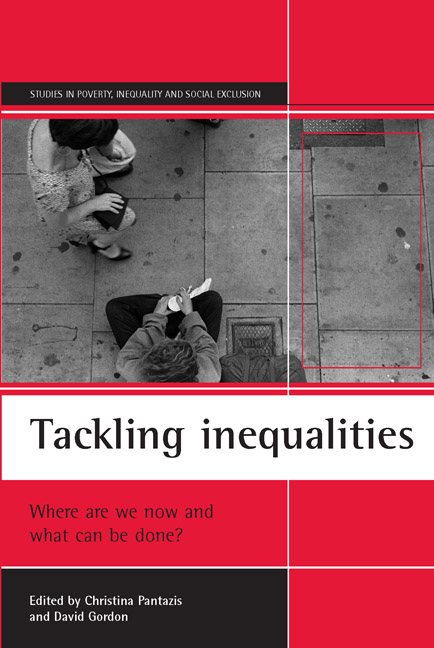Book contents
- Frontmatter
- Contents
- List of tables and figures
- Preface
- Acknowledgements
- List of acronyms
- Notes on contributors
- 1 Introduction
- 2 Inequalities in income, wealth and standard of living in Britain
- 3 Inequalities in employment: problems of spatial divergence
- 4 Educational inequalities and Education Action Zones
- 5 How can we end inequalities in housing?
- 6 Tackling inequalities in crime and social harm
- 7 Poverty across the life-course and health
- 8 Inequalities in health service provision: how research findings are ignored
- 9 A mortality league table for Cabinet ministers?
- 10 Ending world poverty in the 21st century
- Index
3 - Inequalities in employment: problems of spatial divergence
Published online by Cambridge University Press: 05 July 2022
- Frontmatter
- Contents
- List of tables and figures
- Preface
- Acknowledgements
- List of acronyms
- Notes on contributors
- 1 Introduction
- 2 Inequalities in income, wealth and standard of living in Britain
- 3 Inequalities in employment: problems of spatial divergence
- 4 Educational inequalities and Education Action Zones
- 5 How can we end inequalities in housing?
- 6 Tackling inequalities in crime and social harm
- 7 Poverty across the life-course and health
- 8 Inequalities in health service provision: how research findings are ignored
- 9 A mortality league table for Cabinet ministers?
- 10 Ending world poverty in the 21st century
- Index
Summary
Introduction
Access to employment is crucial to people's ability to participate in many of the economic and social opportunities of society. Inequality in access to jobs contributes substantially to poverty and social exclusion, with debilitating effects on the morale, health, family status and even social networks of individuals and communities. Access to employment is also important for the efficient functioning of the economy. Spatial variations may create imbalances between the supply and demand for labour in different places and constrain the rate at which firms and the economy can grow. Labour shortages may be created in some places and surpluses in others.
This chapter considers some of the key dimensions of labour market inequality in Britain. It focuses on the geography of employment and unemployment and examines their incidence in relation to the issues of gender and socioeconomic status or occupation. Contradictory views exist about the current scale and distribution of unemployment. The Bank of England believes that the labour market is tight and that spatial disparities are insignificant. In contrast, the Unemployment Unit's broad measure of labour market slack is 4.7 million unemployed with wide regional variations (Bivand, 1999a). There are tentative signs of a shift in government thinking on the subject since Labour was elected. Its 1998 Budget Report observed that: “Around 11.75 per cent, or almost 4.25m, of working age people in the UK are still without work and wanting a job … the number of inactive people who say they want a job as a proportion of the adult population is higher in the UK than in any other EU country” (HM Treasury, 1998a, p 86).
This chapter will argue that unemployment is not only high but, more importantly, is unevenly distributed across the country and is particularly high in Britain's major cities. This reflects the severe decline in employment over several decades, particularly of manual jobs in manufacturing, and the lack of suitable alternative opportunities accessible to the affected communities. Current labour market disparities are important for economic and social reasons and threaten to undermine some of Labour's flagship policies, such as the New Deal. Many of the previous government's policies disregarded such disparities. There was a tendency to believe that market mechanisms would remove them through out-migration, outward commuting and upward occupational mobility. This chapter examines the extent to which this has happened in practice.
- Type
- Chapter
- Information
- Tackling InequalitiesWhere Are We Now and What Can Be Done?, pp. 59 - 86Publisher: Bristol University PressPrint publication year: 2000



